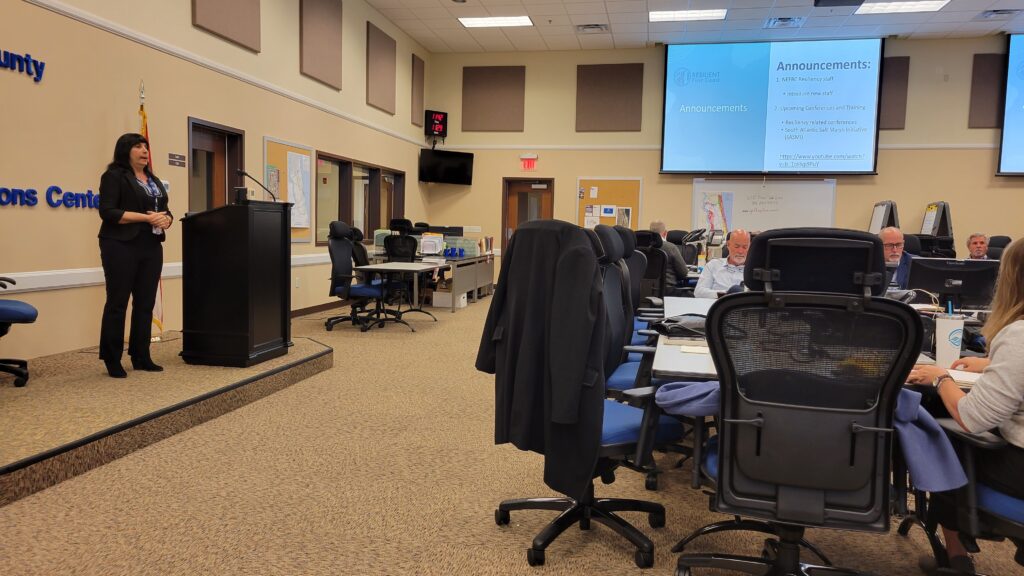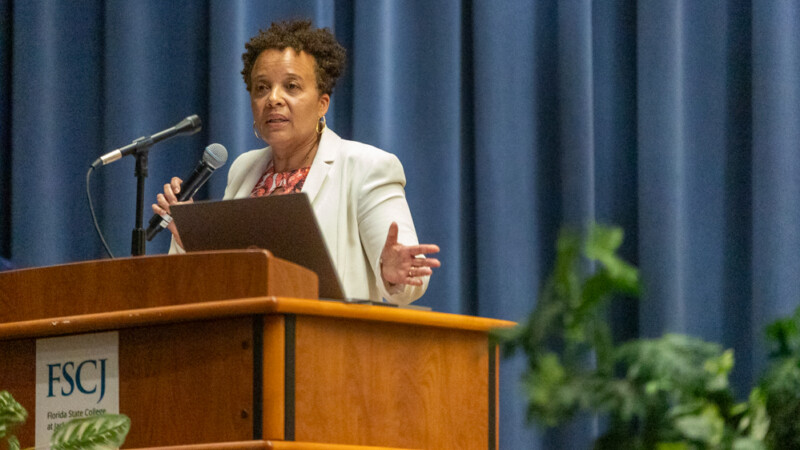Seven counties in Northeast Florida are joining efforts to reduce coastal flooding and battle increasing heat, pollution and storms.
Representatives of Baker, Clay, Duval, Flagler, Nassau, Putnam and St. Johns counties met Wednesday as part of the Resilient First Coast Collaborative, a partnership of government, business, nonprofit organizations, academic institutions and government officials.
Together, they discussed how to protect the region from the effects of climate change and how to find money for the work.
Coordinator Fara Ilami said the meeting was aimed at updating all members on what the collaborative’s committees — environment, infrastructure, quality of life and economic resilience — are doing in regard to resiliency.
“We are trying to get people involved in different ways and let them know how they can get involved,” Ilami said. “We are trying to inform them about funding sources that are available for funding resiliency types of projects. …. My hope is that we get some projects that will really make a dent in those current greenhouse gas emissions that we are putting out right now in a meaningful way; not just put out targets, but achievable targets that we can reach.”

One funding source is the Climate Pollution Reduction Grant program at the Environmental Protection Agency, which provides $5 billion in grants to develop and implement plans for reducing greenhouse gas emissions and other harmful air pollution.
Jacksonville was awarded $1 million from the program two months ago to develop a comprehensive climate action plan with Northeast Florida communities, which can submit ideas via a survey due next spring.
“What we really want to do is develop this climate action plan and make our area eligible for upwards of $500 million in implementation grants to address carbon emissions, and even explore some really creative ideas like …. more solar as well,” said Ashantae Green, a Jacksonville’s resiliency office planner.
Wednesday’s meeting included a live video presentation from Jacksonville’s first chief resilience officer, Anne Coglianese, talking about what her office has come up with since she was brought on board.
Displaying maps and graphs, Coglianese showed the members where flooding, heat, high winds and wildfire risks are expected to worsen in the city due to climate change.
The city could see twice as many extreme rainfalls by the year 2070, including 40 to 60 high tide flooding days by 2050, up from just four in 2021, Coglianese said.
Northeast Florida also could experience as much as 2.3 feet of sea level rise by 2060, which would exacerbate both coastal and river flooding. Solutions also are needed to ameliorate the 12-degree difference in temperature that some parts of the city face, as determined in a large-scale urban heat mapping study, Coglianese said.
“What we found is that if we carried out development as we have in the past, we are likely to see, by 2070, three times as many residents exposed to flooding,” Coglianese said “You can’t just bury your head in the sand and just think about that risk today, because it’s a compounding issue.”
Judy Holm, a Jacksonville resiliency office planner, told the audience about the Climate Pollution Reduction Grants program, which includes $250 million for noncompetitive planning grants and about $4.6 billion for competitive ones. But first, those interested in the grant in the seven-county area must answer the survey on what projects they could seek funding for, she said.
“We look forward to creativity, to innovations,” Holm told the audience. “And most importantly, all of the projects that we put in the implementation agreement, which is where the money will be assessed and delivered, is basically going to be based on the emission reductions.”
Based on input from the survey, due in March, Holm said they “assess the viability and success” of top proposals and take the next step toward possible funding — filing grant applications.
The next Resilient First Coast Collaborative meeting is set for March 27, although that is tentative, officials said.







